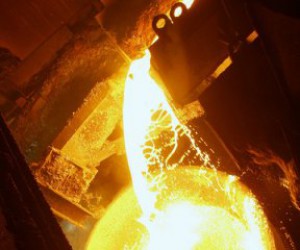South Africa's Cabinet has endorsed a report recommending the introduction of export taxes on iron-ore and steel, where appropriate, to push producers to sell more of their products domestically and to protect local manufacturers who have been struggling to pay export-level prices.
"The manufacturing industry has been seriously impacted by the price increases that happened globally in iron ore, which means iron ore producers have been biased towards exports, disadvantaging the local market," Phumla Williams, a Cabinet spokeswoman, told reporters on Thursday.
The recommendations, scheduled for 'urgent implementation', also seek to boost the domestic use of steel, especially as South Africa embarks on a massive infrastructure investment programme that includes new railway lines and ports.
Williams could not provide details on the potential tax but said the relevant Ministries, which include the departments of Minerals, Trade and Finance, would look into its implementation.
South Africa's market is currently dominated by Africa's biggest iron-ore producer Kumba Iron Ore, a unit of Anglo American and the continent's biggest steelmaker ArcelorMittal South Africa (Amsa).
Meanwhile, discussions with potential offshore investors for the establishment of a new steel producer in South Africa were "... at a relatively advanced stage", the Department of Trade and Industry (DTI) said in a statement.
New steel capacity, which is being spearheaded by the Industrial Development Corporation (IDC), would support government's steel developmental pricing policies and align with a raft of other measures including changes to mining law and the Competition Act.
The proposed overhaul of steel pricing in South Africa is recommended in a report compiled by the Inter-Department Task Team (IDTT) of Iron Ore and Steel which was formed in 2010 in the wake of a dispute between Kumba Iron Ore and Amsa regarding the price of iron ore supply with Kumba saying a historic cost plus 3% agreement on iron ore to Amsa should be altered to reflect market-related pricing.
They include changes to the Minerals and Petroleum Resources Development Act (MPRDA), alterations to the Competition Act, and the strengthening of terms that fall under the International Trade Administration Act that would more tightly regulate the export of scrap metal.
The IDTT document also referenced the “… strategic utilisation of state infrastructure to support development outcomes …”. It’s thought this relates to providing discounted freight rates on the Sishen to Saldanha railroute that Transnet Freight Rail, a division of state-owned Transnet, was currently expanding.






